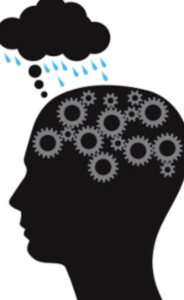Introduction
Diagnosis and treatment of depression in individuals with autism varies from the approach to find and help  neurotypicals experiencing depression. A study done at Vanderbilt University with 1272 autistic children found that 20.2% of young adults aged 13-17 with autism also have a depression diagnosis. That is nearly twice the percent of adolescents in the general population who are identified as depressed. Due to the frequency of these comorbid diagnoses, more research and awareness should be brought to explain why these two conditions occur at the same time so often and what treatments can help individuals affected.
neurotypicals experiencing depression. A study done at Vanderbilt University with 1272 autistic children found that 20.2% of young adults aged 13-17 with autism also have a depression diagnosis. That is nearly twice the percent of adolescents in the general population who are identified as depressed. Due to the frequency of these comorbid diagnoses, more research and awareness should be brought to explain why these two conditions occur at the same time so often and what treatments can help individuals affected.
Difficulty in diagnosis
People with autism may exhibit certain symptoms, like hyperactivity, self-injurious behavior, or  dramatic changes in level of functioning, of depression not found in neurotypicals who also have depression. Identifying depression in someone with autism may be more difficult for professionals because of the extended list of symptoms and the overlap between aspects of autism and depression. Typical symptoms of depression, such as loss of energy, sadness, difficulty concentrating, or sleeping problems, could be misinterpreted as behavior due to having autism. The combination of symptoms is different for each individual and at times an adolescent could be diagnosed with a completely separate disorder. For example, aggression and catatonia are found in individuals with schizophrenia and those with depression and autism. Distinguishing between the disorders becomes problematic and medical professionals could dismiss a child as schizophrenic when in reality, the individual is comorbid.
dramatic changes in level of functioning, of depression not found in neurotypicals who also have depression. Identifying depression in someone with autism may be more difficult for professionals because of the extended list of symptoms and the overlap between aspects of autism and depression. Typical symptoms of depression, such as loss of energy, sadness, difficulty concentrating, or sleeping problems, could be misinterpreted as behavior due to having autism. The combination of symptoms is different for each individual and at times an adolescent could be diagnosed with a completely separate disorder. For example, aggression and catatonia are found in individuals with schizophrenia and those with depression and autism. Distinguishing between the disorders becomes problematic and medical professionals could dismiss a child as schizophrenic when in reality, the individual is comorbid.
Potential Treatments
The brain of someone with autism works differently than a patient without. Antidepressant drugs that work on the typical brain may have different effects on a brain of an individual with autism. The standard medication for adolescents with diagnosis for the comorbid disorders is selective serotonin reuptake inhibitors, although there is not much evidence that these drugs are effective and the drug often causes many unwanted side effects. Therapists can use other methods to try to  help the depressed feelings. Therapies that do not use medication, like cognitive behavioral therapy, allow patients to alter the way they think about their problems and consequences to their actions. The psychotherapy works to help individuals focus on solutions to decrease symptoms of depression. This has only been proven to help people who don’t have autism, so therapists are trying to adapt the method for autistic individuals. Researchers are also looking into a mindful approach where patients are encouraged to meditate and not judge or analyze their experiences. Comorbid individuals are taught breathing exercises and to meditate for extended amounts of time in an effort to lessen symptoms of depression.
help the depressed feelings. Therapies that do not use medication, like cognitive behavioral therapy, allow patients to alter the way they think about their problems and consequences to their actions. The psychotherapy works to help individuals focus on solutions to decrease symptoms of depression. This has only been proven to help people who don’t have autism, so therapists are trying to adapt the method for autistic individuals. Researchers are also looking into a mindful approach where patients are encouraged to meditate and not judge or analyze their experiences. Comorbid individuals are taught breathing exercises and to meditate for extended amounts of time in an effort to lessen symptoms of depression.
Although there are a few therapies and medications that potentially could lessen the symptoms of depression in a comorbid individual, there is still room for improvement on these practices. Increasing awareness of the high rate of comorbidity could allow more children with autism to be tested earlier for depression to begin treatments as soon as possible. Learn more about research going into teenagers affected by autism and depression by clicking here!
This post did a good job bringing attention to some of the complexities in interacting symptoms of comorbid disorders. It seems that some of the behaviors you listed as symptoms of depression in autistic individuals are in conflict with or, in some cases, the opposite of symptoms experienced by neurodiverse individuals with depression. For example, hyperactivity seems to be in conflict with the typical symptom of reduced energy seen in individuals with depression.
However, hyperactivity could relate to anxiety disorders, which are often comorbid with depression. Do you think that the presence of hyperactivity in autistic individuals with depression may stem from a third comorbidity with anxiety? If so, this would make the diagnosis even more complicated. Overall, comorbidity with autism and other disorders in general seems to imply that symptom expression can come in many different combinations.